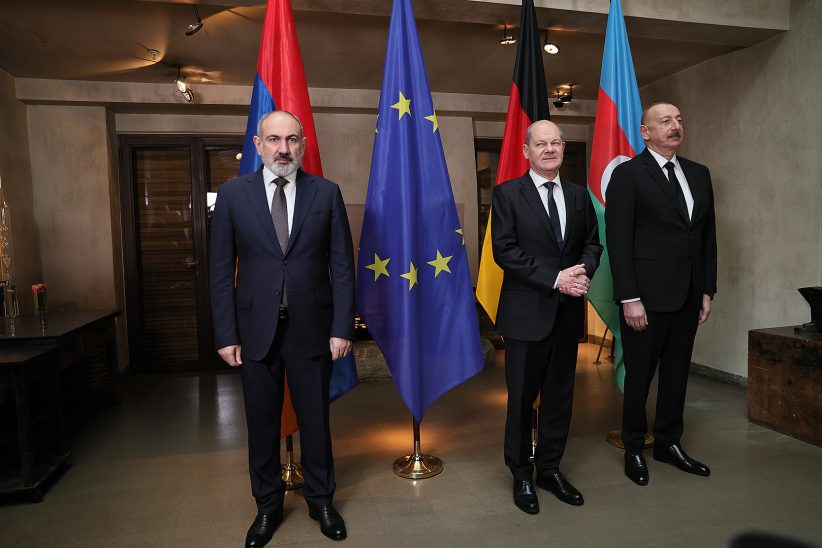Over the weekend, Armenian Prime Minister Nikol Pashinyan and Azerbaijani President Ilham Aliyev met in Munich with German Chancellor Olaf Scholz’s mediation. This was the two leaders’ first meeting in the past six months, if we do not count their short, informal encounter at the end of last year at a Commonwealth of Independent States summit in Saint Petersburg. During the Munich negotiations, which lasted about 45 minutes, the sides agreed to continue working on a peace treaty and on border delimitation, the latter within the framework of a bilateral commission.
Notably, the meeting took place shortly after early presidential elections in Azerbaijan, as well as the latest border escalation near the village of Nerkin Hand, which saw Azerbaijani forces kill four Armenian soldiers.
The meeting was important primarily for each side to gauge the other’s disposition and assess the nuances of the ongoing negotiations.
Importantly, the fact that the Munich meeting took place with Scholz’s participation and mediation does not imply a return of the Western-led negotiation track. Instead, this meeting was likely an ad hoc arrangement, conditioned solely by the presence of both Aliyev and Pashinyan at this year’s Munich Security Conference.
After the ethnic cleansing of Artsakh last September, Azerbaijan successfully managed to move the negotiation process to a bilateral format. The agreements reached between the two countries last December were the first, tangible results of that new format. During the past few months, all substantive negotiations were conducted in this new, non-mediated format. Pashinyan has hinted about these talks several times, without providing details.
During the first months, there was no mention of these secret negotiations in the press. However, some leaks have surfaced recently, and well-known foreign journalists and experts closely following the region have started writing about it. This format is, by and large, the reincarnation of the Gerard Libaridian – Vafa Guluzade negotiations that existed in the mid-1990s, with the participation of both old and new actors.
The main goal of the Munich meeting was, in all likelihood, clarifying the prospects of negotiations within that bilateral format. In the period after the presidential elections in Azerbaijan, after a number of Aliyev’s problematic statements, as well as after the incident in Nerkin Hand, there were serious concerns in Yerevan that Baku is inclined to escalate the situation. Those concerns were also expressed publicly by Pashinyan. At this stage, however, it seems that for Baku, escalation and the threat of further violence is not the goal in and of itself, but rather an important tool influencing the content of the negotiations.
In that sense, public comments from Baku and Yerevan after the Munich meeting, which emphasize its constructive nature, refer primarily to the continuity of the negotiation process rather than its content.
When it comes to content, expecting any significant changes is futile given the current circumstances. It is obvious that Azerbaijan will continue to move forward with a maximalist agenda, pushing its main goal of avoiding solutions to and clarity in the problematic issues between the parties, as well as to increase its control over Armenia and to assume the status of a “mini-hegemon” in the South Caucasus. The implementation of that agenda is in direct conflict with the existence of Armenia as an independent and sovereign state.
Tigran Grigoryan is a columnist for CivilNet and the director of the Regional Center for Democracy and Security, a Yerevan-based think tank.
















